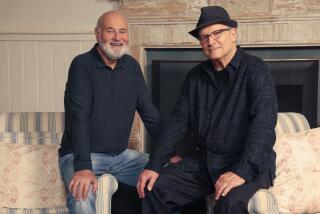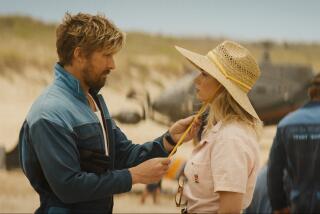MOVIE REVIEW : Brooks Hits Fly Ball in ‘Scout’ but Not Over Fence
For those of us who fervently believe Albert Brooks is the funniest man in America and can do no wrong, “The Scout” offers up a dilemma. As New York Yankee baseball scout Al Percolo, Brooks is hilariously “right,” but, boy, did he pick the wrong vehicle.
Not that you can blame him, exactly. There’s a lot of talent in this baseball comedy, which was directed by Michael Ritchie and co-written by Brooks and Andrew Bergman and Monica Johnson, and co-stars Brendan Fraser and Dianne Wiest. That’s exactly why its creeping mediocrity seems like a perverse joke.
The creep doesn’t really start until the film enters its second half-hour or so. Until then, it’s a knockabout showcase for Brooks, and it’s a stitch--pure Brooksian riff. Wearing a straw hat and a paunch, Al weasels his way into the good graces of a God-fearing pitching phenom (Michael Rapaport) only to have the boy throw up and punk out just before his Yankee Stadium debut.
Demoted by the Yankees general manager (Lane Smith) to scouting the Mexican backwaters, Al bounces from town to town until he accidentally happens upon a local sensation unknown to any previous scout--Steve Nebraska (Fraser), a gangly, dippy American mysteriously ensconced without family in Mexico. Brought into the makeshift Mexican stadium on a cheap-jack throne, looking like a bargain-bin Cleopatra entering Rome, he proceeds to whiff batters with his 100-plus-m.p.h. fastball and then, taking the plate, slams the ball out of the park.
*
Al is flabbergasted at his fortune--he feels like he’s bringing King Kong to New York in glory. (Early on, we see Al watching “Kong,” his favorite movie, on TV--the “original” version! he exults.) But, when the Yankees drop him before his arrival, he cooks up a personal contract with Steve and negotiates a $55-million salary--with the caveat that Steve wait out the rest of Yankees’ dismal season unless they win the pennant. (Guess what happens.) The only hitch: The Yankees require a psychiatric bill of health before they sign. And Steve, who seems to be humming to his own off-key melody, is no shoo-in for sanity.
As long as “The Scout” is sending up baseball escapades, it’s on sure footing. Yankees owner George Steinbrenner, playing himself, is unexpectedly hilarious: He has a great moment when he rolls his eyes at a reporter’s crack that his team has no chance at a pennant. There’s been so much folkloric blather about baseball lately--including the 18-hour PBS “Baseball” series--that the livid silliness of the best parts of “The Scout” are tonic.
But the filmmakers don’t seem to know what’s good about their subject and what should be ejected from the game. Once Steve makes it to New York and moves in with Al--who takes a fatherly responsibility for his prize--the film quickly devolves into a series of vaguely serious and unfunny set pieces backed by an infernally “Rocky”-esque Bill Conti score.
Cutting shears seem to have excised vast swatches of continuity. Steve, for example, inexplicably loses his love for the sport. We never find out what he was doing in Mexico or anything about the whereabouts of his family. He’s billed as a stud, but the film allows him no dalliances (unless one counts a cryptic suggestion of one with a Yankee assistant played by Anne Twomey in what must be the tiniest cameo ever recorded by a celebrated, Tony-nominated Broadway actress).
When he enters therapy with--har-har--Dr. H. Aaron (Wiest), we don’t find out much more about their sessions than the obvious--he’s looking for a father-figure. We don’t know just how nut-brained Steve really is.
Fraser is enjoyable in a bland, callow way that doesn’t really give the film much of a center. He doesn’t spark Brooks, who works best when he’s acting one-on-one, and that’s unfortunate since the entire cramped, skimpy production is practically a duet for two actors. (It might have been developed from a two-character play, although, in fact, the script, in various stages of development, has been around since 1982.) The film edges toward sappiness instead of nuttiness. It turns into just what you don’t want it to become: a buddy-buddy bond-a-thon.
Ritchie is sometimes a whiz at comedy. Couldn’t he see the potential in pairing Brooks with Wiest? In their one real scene together, when Al is trying to cajole the doctor into signing a clean bill of health sight unseen, the air is frisky with comic possibilities. (It’s reminiscent of that great scene in Vegas in Brooks’ “Lost in America,” where he tries to talk Garry Marshall into giving back the money.) These two work so well together that you expect some kind of romance to develop, or perhaps a group therapy situation. Instead, you’re left with a hunk of heartfelt whimsy.
You can tolerate “The Scout” for Brooks’ bull-necked exasperation and fixated double takes. Against all odds he creates a lived-in character beneath that straw hat. But, as you leave the theater, the heavy musk of wasted opportunity crowds the air.
* MPAA rating: PG-13 for a moment of strong language. Times guidelines: It includes a scene with a potential knife attack.
‘The Scout’
Albert Brooks: Al Percolo
Brendan Fraser: Steve Nebraska
Dianne Wiest: Dr. Aaron
Lane Smith: Ron Wilson
A Twentieth Century Fox presentation of a Ruddy Morgan production. Director Michael Ritchie. Producers Albert S. Ruddy and Andre E. Morgan. Executive producers Jack Cummins, Herbert S. Nanas. Screenplay by Andrew Bergman and Albert Brooks & Monica Johnson. Cinematographer Laszlo Kovacs. Editors Don Zimmerman, Pembroke Herring. Costumes Luke Reichle. Music Bill Conti. Production design Stephen Hendrickson. Set decorator Merideth Boswell. Running time: 1 hour, 47 minutes.
* In general release throughout Southern California.
More to Read
Only good movies
Get the Indie Focus newsletter, Mark Olsen's weekly guide to the world of cinema.
You may occasionally receive promotional content from the Los Angeles Times.










